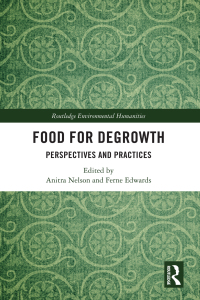Buy Food for Degrowth: Perspectives and Practices 1st Edition PDF ebook by author Anitra Nelson; Ferne Edwards – published by Routledge in 2021 and save up to 80% compared to the print version of this textbook. With PDF version of this textbook, not only save you money, you can also highlight, add text, underline add post-it notes, bookmarks to pages, instantly search for the major terms or chapter titles, etc.
You can search our site for other versions of the Food for Degrowth: Perspectives and Practices 1st Edition PDF ebook. You can also search for others PDF ebooks from publisher Routledge, as well as from your favorite authors. We have thousands of online textbooks and course materials (mostly in PDF) that you can download immediately after purchase.
Note: e-textBooks do not come with access codes, CDs/DVDs, workbooks, and other supplemental items.
eBook Details:
Full title: Food for Degrowth: Perspectives and Practices 1st Edition
Edition: 1st
Copyright year: 2021
Publisher: Routledge
Author: Anitra Nelson; Ferne Edwards
ISBN: 9780367436469
Format: PDF
Description of Food for Degrowth: Perspectives and Practices 1st Edition:
This collection breaks new ground by investigating applications of degrowth in a range of geographic, practical and theoretical contexts along the food chain. Degrowth challenges growth and advocates for everyday practices that limit socio-metabolic energy and material flows within planetary constraints. As such, the editors intend to map possibilities for food for degrowth to become established as a field of study. International contributors offer a range of examples and possibilities to develop more sustainable, localised, resilient and healthy food systems using degrowth principles of sufficiency, frugal abundance, security, autonomy and conviviality. Chapters are clustered in parts that critically examine food for degrowth in spheres of the household, collectives, networks, and narratives of broader activism and discourses. Themes include broadening and deepening concepts of care in food provisioning and social contexts; critically applying appropriate technologies; appreciating and integrating indigenous perspectives; challenging notions of ‘waste’, ‘circular economies’ and commodification; and addressing the ever-present impacts of market logic framed by growth. This book will be of greatest interest to students and scholars of critical food studies, sustainability studies, urban political ecology, geography, environmental studies such as environmental sociology, anthropology, ethnography, ecological economics and urban design and planning.





